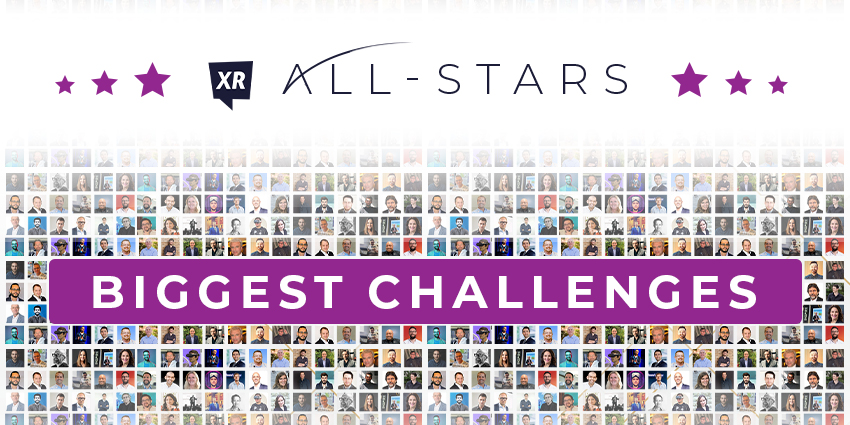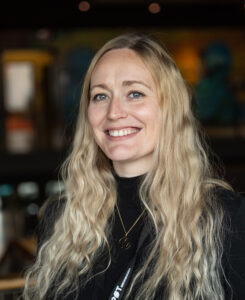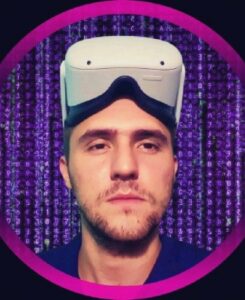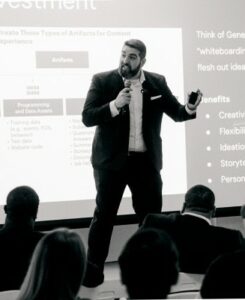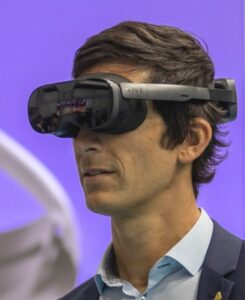As part of our inaugural XR All-Stars series, we asked a host of XR Leaders to name their thoughts on the industry’s biggest challenges.
Below is a snapshot of some of their answers. You can view their complete answers to these questions and more in XR All-Stars or click a leader’s name to view their full profile.
Some All-Stars focused on areas like technological innovation while ensuring ethical and responsible implementations.
Others picked out business growth and challenges, demonstrating the value of their innovations amidst fluctuating market dynamics.
Here are some of their answers.
Innovation and Technological Advancement
Some All-Stars focused on leveraging new technologies and staying ahead of rapid advancements in their respective fields.
Technology Evangelist Kevin O’Donovan said keeping up with the latest innovation is becoming more complex – even for experts.
“The biggest challenge I face is striving to stay ahead or at times just trying to keep up with the rapidly evolving technological trends,” he said.
“Now it’s an impossible task to try to keep up to date on all the ‘latest and greatest’ tech these days, the pace of innovation is incredible.
“So what I strive to do is to ‘stay ahead’ in relation to some of the bigger picture trends, for example, what’s the “art of the possible” when it comes to digital twin use cases, and then to be able to translate that back to what’s feasible for companies to implement today.”
Jan Pflueger, Creative Technologist / Founder & Advisor at advisXR, agreed that keeping up with the pace of innovation is a challenge.
“How to deal with all the different approaches and directions of technology and how do you keep up with the speed of development out there,” he said.
“There’s a lot more uncertainty for the business than there used to be, and to navigate through you need a clear vision and overview of what’s possible right now and what’s coming next.
“Staying focused and doing the right things at the right time will be more challenging than before.”
Gabriele Fiorenza, VR Developer at Daedalus XR, said the same – with a particular focus on constantly changing software.
“Navigating the ever-evolving landscape of software updates, particularly in game engines like Unreal Engine, is both exciting and demanding,” he said.
“While the constant influx of new features and improvements fuels innovation, staying abreast of the latest developments requires unwavering attention to detail and a commitment to continuous learning.”
Other All-Stars shared the sentiment.
- Carlos J. Ochoa, Founder and CEO of ONE Digital Consulting / VRAR Association, said: “The greatest challenges for 2024 revolve around the design and development of Leonardo Da Vinci’s Immersive World. It’s an exclusive, immersive masterpiece meant to inspire the new generations of youth, blending experiential technologies with music and nature into a whole that’s almost impossible to imagine.”
- Sam Field, Global Partnerships at Rock Paper Reality, said: “Being on the bleeding edge with new and innovative solutions for our partners, while staying grounded with compelling and seamless experiences for their customers.
- Rob Petrosino, Chief Innovation Officer at, PeakActivity, said: “Trend tracking AI and its impact on not only spatial computing and XR tech but the spillage into all areas of a business from OPs to Marketing.
- Nick Roseth, Chief Explorer at Explore Design, said: “Keeping up with technology and innovation as the rate of change continually increases.”
- John Blackmon, CTO at ELB Learning, said: “For me it is really twofold, keeping up with the pace of change with advancements such as AI, while still managing an ever growing number of cybersecurity threats.”
- Reto Grob, CEO at Augment IT, said: “The rise of the consumer platforms with Apple and Meta provides a lot of opportunities for the long-term but also provides its own challenges when adapting it to enterprises.”
On the other hand, Fernando Cazares, Lead Digital Engineer at Capgemini, saidlogy is actually the problem obsolete techno among potential customers.
“The biggest challenge I face in my role in 2024 is that many manufacturing companies have yet to upgrade their IT infrastructure in the era of AI,” he said.
“Technology is evolving very fast, and this rapid pace becomes a significant problem for companies that don’t have a plan or are resistant to change. Helping these companies navigate and adapt to these advancements is both a critical and demanding task.”
Market Challenges
Some All-Stars focused on business growth and market challenges, particularly managing financial constraints and achieving sustainable growth.
They emphasise the need to innovate and attract attention to their products despite limited budgets among potential customers.
For many in the XR industry, 2023 was a time of tightening the purse strings,” said Kevin Joyce, CEO at Tiny Brains.
“As such, we’re having to do more with less. We’re constantly finding new ways to innovate and bring new eyes to products, without adding significantly to the cost.
“We’re constantly finding new ways to innovate and bring new eyes to products, without adding significantly to the cost.”
Thomas Dexmier, AVP of Business Development & Enterprise Solutions at HTC VIVE, said the biggest challenge is convincing people of XR’s benefits beyond VR headset gimmicks.
“How do we convey the benefits of XR?” he said.
“In the industry, we all know how amazing it is to see that manufacturing processes designed and tested in XR can save costs and resources, or that surgeons can practice the most delicate procedures over and over, using 3D scans of their actual patient.
“But the mainstream audience, they’re too easily drawn to clout-chasing viral moments, like “walking a robot dog while wearing an XR headset.” Things like that do a disservice to the wider XR industry, where you’ve got incredible talent at every level, from design and coding, through to pushing the limits of hardware.”
Others stressed the importance of standing out in a “noisy” market.
- David Moreno, Chief Business Development and Marketing Officer at Virtualware, said: “As the Business Development and Marketing lead, driving results with key partners and relationships, as well as positioning our brand and product in this “noisy” enterprise XR space, are my fundamental challenges for 2024.”
- Sara Johnston, COO at Motive.io, said: “How do we tell the world about what we have built with a limited marketing budget?”
- Christian Venables, Creative Director and Co-Founder at Radical Realities, said: “Building a new brand, communicating the right messages and showing everyone how we’re different from the rest.”
- Nicolas Mignan, CEO of VirtualiSurg: “To raise VirtualiSurg to rank amongst the international leader.”
- Mr. Shah Reyad Farabi Shah, Co-Founder & CEO at Azmi Studio: “Businesses often seek clear evidence of return on investment before adopting new XR technologies. Providing concrete examples of how XR can improve efficiency, productivity, or customer engagement can help overcome this hurdle.”
- Randy Nunez, Managing Principal at Nunez Consulting, said: “Getting broader adoption of XR. The rise of AI, the downfall of the Metaverse, and the economical conditions have caused organizations to re-prioritize efforts away from XR.”
- Matt Tullis, VP of XR at Ultraleap, said: “As VP of XR I can see the incredible potential of the XR market, however, it hasn’t actualised as projected in recent years.”
- Meuy Xaimuangmonh, Founder and CEO unbox vr, said: “Getting everyone excited and invested into immersive technology again.”
- “XR Mischief Maker” Damon Shackelford: “Helping my peers and myself communicate to the C-suite why they should invest in XR and how XR implementation results in bottom line profit”
- Sören Syrbe, COO at Wonderland, said: “Find more clients. This is particularly difficult in the game engine industry because many people find it hard to change the software they are used to, even if the new software is much more efficient and better.”
Personal Challenges and Resilience
Some All-Stars highlighted personal challenges, work-life balance, and maintaining ethical and empathetic approaches in their roles as their biggest challenge.
- Amy Peck, CEO at EndeavorXR, said: “My business challenges are exhilarating! My biggest challenge is managing all the travel – I did 300 hotel nights in 2023 – I’m trying not to repeat that this year.”
- Julie Smithson, Co-Founder of METAVRSE & XR Women, said: “My biggest challenge for 2024 is to stay resilient in situations beyond my control, especially when dealing with unfair or difficult circumstances. By focusing on what I can control, practicing self-care, aligning myself with inspiring, positive people is how I plan to face the challenges, grow and level up.”
- Matthew Chaussee, CEO & Co-Founder at CareerViewXR, said: I think the biggest challenge will be defining what my role becomes in the organization.” As we have continued to grow, the responsibilities on my plate have been in a constant state of flux, and it’s challenging at times to determine what needs stay, what needs to go, and what I need to make room for.
- Slawomir Matul, CEO & Founder at VR Factory Games and Skillmmersion, said: “There are several challenges, both in the business world and in my personal life. The biggest one, which I have been setting myself for many years, is to always be a good, empathetic and honest person no matter what the circumstances.”
- Harriet Bartlett, Founder at Only XR, said: “I have made a big move from France to Australia, I’m learning how to establish here. It’s a road full of adventure ahead!”
- Lair Anderson, Researcher at LAPISCO, said: “One of the biggest challenges I face in my role in 2024 is learning how to build AI models and merge them with Virtual Reality (VR).”
- Tom Ffiske, Editor at Immersive Wire: “Getting enough sleep.”
- Jay Latta, Chief Dreamer at Strategic Intelligence for New Technologies (STINT), said : “My new adventure. Guess it will keep me busy the next 10 years.”
- Radhika Mukhija, Co-Founder of Higher Prana Virtual Reality, said: “Launching a startup and finding time to write my book. (recently got a book contract for my book proposal)”
Education and Training
A selection of All-Stars said the biggest challenge in the XR industry centre is the development of educational and training programmes, especially concerning VR technologies.
Robert Desrosiers, CEO and Creative Director at SimAcademy, said improving the feasibility of virtual reality in the education space is key to the industry’s ongoing success.
“Raising the bar for XR as a credible academic platform alongside computer-based and in-person performance assessment,” he said.
“XR technology has fundamentally changed how we learn skills that require hands-on experience.
“And yet, despite the method’s numerous benefits and positive outcomes, there is still not a way to prove your expertise after excelling in XR-based training software.
“We in the industry have ways to measure and assess performance, but there is no proof, such as a certification, that you can share with peers and decision-makers. We want to change that.”
Team Management and Business Growth
Some All-Stars cited their challenges as improving operational efficiency, managing teams, and navigating organisational challenges.
Miranda Palmisano, CEO at MadXR, said that managing fluctuating volumes of work is typical of the project-based nature of XR – but that doesn’t make it any easier to manage.
“This includes balancing our team’s capacity during periods of high demand without overextending resources during slower times,” she said.
“Finding a sustainable approach to scaling our operations—avoiding the constant cycle of ramping up and down—requires strategic planning and a flexible business model that accommodates the fluctuating nature of project-based work, ensuring we remain agile yet stable as we grow.”
Others said:
- Caleb Trees, Director of Operations at Immersed, said: “Equipping our team for the appropriate growth that we anticipate having later on.”
- Steve Grubbs, CEO at VictoryXR, said: “Transitioning from the company living partially off investor dollars to the revenue we win through sales, as well as the transition to a 3D spatial AI product deployed on Chrome Browsers.”
- Jonathan Hale, CEO & Founder at Wonderland, said: “The markets have changed significantly for startups in the past three years.”
- Sean Hurwitz, CEO at PIXO, said: “Managing cash flow as the market continues to evolve.”
- Tim van Dam, General Manager at Changefield, said: “Growing the company to the Next Level.”
- Adam Pomeroy, Middle East Operations Director at Luminous XR, said: “I believe managing the delivery of our extensive range of solutions will be one of my biggest challenges.”
- Alex Berlin, Founder & President at Arvizio, said: “Expanding customer base, securing funding to support Arvizio growth and operations.”
- Aldo Petruzzelli, CEO at Omnia, said: “I want to be able to showcase our potential to more DoD customers and close our seed round at a valuation we deserve. I will also find it difficult to manage a remote team and an in-person team at our HQ in Chicago.”
- Cory Grenier, CEO & Co-Founder at GEENEE, said: “Meeting the high demand for intelligent, automated, spatial personalization services that require novel solutions without precedent.”
- Amir Bozorgzadeh, Co-founder and CEO at Virtuleap, said: “Launching our SaaS platform by Q3 and hitting the ground running in establishing a recurrent and scalable sales engine, and so moving away from the “pilot purgatory” phase that we are currently in.”
- Rodrigo Mulinário Ramos, Product Owner at FITec, said: “Having to create the VIP box experience for Carnival at the São Paulo samba stadium in a very short timeframe, including implementing new features that the client requested during the project’s development.”
Ethical and Social Responsibility
The ethical conundrums surrounding emerging technologies like extended reality and AI are so intense that they’ve dragged the issues into mainstream media coverage—often in a negative way.
One of the biggest challenges for the XR industry is to prove its potential for good and its commitment to doing good in a safe way.
“I think the passion and the intent to do world-changing things together is really bubbling up to the surface and this excites me because there’s so much promise and potential in this moment in time,” said Jennifer Rogers, Executive Officer of Learning Technology Standards Committee at IEEE.
“Now is the time to start getting very serious about open standards and foundational infrastructure that will ensure that we really do create sustainable value and champion accessibility.
“This is work that doesn’t always get a lot of front-page headlines and does come at a cost with regards to time and effort, but is essential for us to collectively get this right.
“My biggest challenge for 2024 will be motivating all of the brilliant people who are passionate about this space to come together and co-create a vision that we can build together, one that represents a diversity of perspectives and ideals but, in the end, maximizes the value to humanity as a result.”
Paul Jones VP of Technology Strategist of Life Sciences at Immerse.io, went further, saying that – while the industry is thinking about ethics – most organisations haven’t considered the complexities of implementing new technology.
“It’s like finding a unicorn if someone I speak to is thinking about “next phase” and external use cases for their customers,” he said.
“They certainly aren’t considering trust, governance, compliance, privacy, security, Data and IP loss, cost avoidance, etc.
“It’s a huge educational journey to understand the complexities of the XR ecosystem, let alone the significant strategic opportunities for platform and technology simplification of their company’s existing platforms.
“That is a huge, but critical strategic leap which C-suite, CIO’s, IT Departments, Architects and the budget holders need to comprehend.”
Other All-Stars agreed:
- Cam Stevens, CEO of Pocketknife Group: “My key challenge lies in maintaining a human-centric approach for my clients that elevates the capabilities and safety of workers. This involves not only implementing intuitive technologies that complement human skills but also engaging continuously with workers to adapt these technologies to real-world needs. The goal is to foster an environment where technology serves as a tool for empowerment and enhancement, ensuring that safety improvements are both effective and supportive of human factors.
- Timothy Bates, Professor of Practice at the University of Michigan – College of Innovation and Technology, said: “The biggest challenge I face in my role in 2024 is navigating the rapid pace of technological change while ensuring ethical and responsible innovation. As technology evolves at an unprecedented rate, balancing innovation with ethical considerations has become increasingly complex.”
- Shawn Grover, VP of Operational Excellence at Trigger XR, said: “One of the biggest challenges right now is balancing XR innovation with ethical responsibility, especially in the current ‘wild west’ age of AI.”
